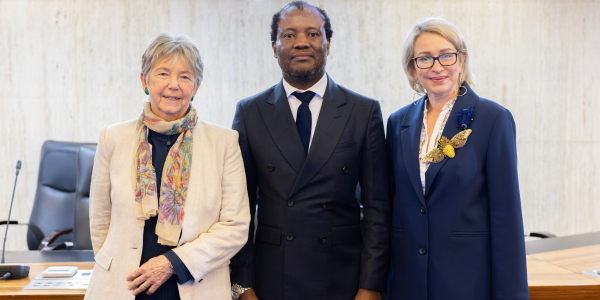Symposium held to honour Professor Boris Balinsky
- Wits University
Wits and the Embassy of Ukraine come together to honour a scientist son of both countries.

The much anticipated Balinsky Symposium got underway on Wednesday as commemoration to the life and legacy of world-renowned Wits scientist Boris Balinsky, who died in 1997.
The two-day event was a celebration of the pioneering biologist, embryologist, and entomologist’s research endeavours, achievements and passion for science over his 92 years of life. In his academic life he earned deep respect as a scientist, teacher, mentor and leader whose work in experimental embryology and electron microscopy was lauded as ground breaking and visionary. He authored over 140 scientific papers and his textbook An Introduction to Embryology was translated into five languages reaching students and scholars across the globe with over 100 000 copies printed.
Held in the Senate Room, the symposium brought together an in-person and online global scientific community, giving researchers from around the world an opportunity to present their work. It was also a nod to Wits’ commitment to enlarge its scientific lineage across generations.
Balinsky’s imprint in South Africa started when he joined the university in 1949 after being forced to leave Ukraine. Post-World War II Ukraine was reeling from a crippling manmade famine that left an estimated 3.9 million people dead and was languishing under Stalin’s brutal influence. As a scientist working in a field of genetics, embryology and evolutionary biology Balinsky and his colleagues faced threats of persecution. As a result his seminal textbook was never translated into Ukrainian or Russian.
The symposium was jointly held by Wits University and the Embassy of Ukraine in South Africa. Planning for the symposium got underway some years ago but was derailed first by Covid-19 and then by Russia’s invasion of Ukraine. But Ukrainian ambassador Liubov Abravitova said the backdrop of an on-going war in her country served as a reminder of the commitment of scientists who continue doing their work to find solutions from science and technology even in the most trying conditions. She added that the realities of what is lost in war should also offer resolve to build strongeracademic bridges between Africa and Ukraine.
Vice Chancellor and Principal, Professor Zeblon Vilakazi said in his opening address that it was a proud day for the University to honour Balinsky, whom he described as a promising scientist who published his first academic paper as an undergraduate student while at the Taras Shevchenko National University of Kyiv.
But he said it was at Wits that Balinsky would find his academic home. “Wits became his sanctuary and its where his work would flourish,” Vilakazi said. Balinsky joined as head of Zoology and went on to become Dean in the faculty of science. He counted among his students and their students a line of eminent scientists, including Wits Emeritus Professor Barry Fabian and Fabian’s student Professor Hazel Sive, currently Dean of Science at Northeastern University in the United States. Both professors spoke on the opening day of the event.
“In this symposium we get to delve into the genius that was Boris Balinsky and explore how his ground-breaking work has had a lasting impact in the field of science. He emerged as a man ahead of his time. He was profound in shaping science and had enlightened views,” Vilakazi said.
Dzvinka Kachur of the Ukrainian Association of South Africa, who also spoke at the symposium, said outside of his wide-ranging scientific pursuits, Balinsky’s journals and personal writings help piece together more of the story of the Ukrainian diaspora.
“The people who left are the missing middle. Balinsky’s very rare memoirs tell us the story between the two world wars,” she said, adding that there are between 5000 and 6000 Ukrainians currently living in South Africa.
Professor Balinsky’s daughter, Helen David, gave a personal tribute at the symposium. Herself an ex-Witsie and one-time lecturer at the university, David fleshed out the picture of Balinsky the husband, father, and grandfather. He was a skilled pianist and painter, consummate reader and a keen mountain climber. David said her father was happiest in nature with a net in his hand to catch butterflies and moths for his extensive collections. If he wasn’t outdoors, he’d be tending to his orchids in the greenhouse he built, weeding the lawn or enjoying a glass of wine and good conversation, even at the age of 92.
David said her father did get to return to Kyiv, visiting twice in the 1990s. She concluded her tribute quoting Balinsky himself from the year he died: “In spite of all troubles, I am a happy man.”

